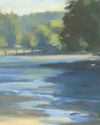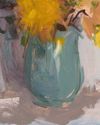
In this project, we will learn how to combine coloured pencil with solvent to create a more painterly effect. Solvent melts the wax binder in the pencil, eliminating strokes and smoothing out the surface of the drawing. This technique also helps speed up the layering of colours.
HOW IT WORKS
Adding a little solvent to a layer of coloured pencil with a soft bristle brush will break down the wax binder and allow you to move pigment around the paper. Solvent fuses the colour into the paper and the layers of pencil become thick and opaque. After it dries, you can apply more layers of coloured pencils and solvent if needed.
I enjoy this technique because I can create rich, vivid colours and make my drawing look more like a painting. It also means I can apply the coloured pencil more quickly and less evenly because I will smooth it out at a later stage.
WHAT YOU WILL NEED
The best pencils to use with solvent are those that have a soft wax base and blend more easily than harder pencils. Practise with different brands to determine which will work best for your type of drawing application.
Choosing the right paper is also a factor. I like a sturdy paper or board that will withstand layers of colour and solvent, and won’t buckle or disintegrate when solvent is added.
I often choose a sanded paper surface because the rough tooth holds the pencil, blends and builds colour quickly, but keep in mind it will also wear down the pencils faster.
For this project I chose a warm red-toned sanded board, as the red background complements the apples so I could allow it to show through in some areas.
Esta historia es de la edición October 2020 de Artists & Illustrators.
Comience su prueba gratuita de Magzter GOLD de 7 días para acceder a miles de historias premium seleccionadas y a más de 9,000 revistas y periódicos.
Ya eres suscriptor ? Conectar
Esta historia es de la edición October 2020 de Artists & Illustrators.
Comience su prueba gratuita de Magzter GOLD de 7 días para acceder a miles de historias premium seleccionadas y a más de 9,000 revistas y periódicos.
Ya eres suscriptor? Conectar

Still life IN 3 HOURS
Former BP Portrait Award runner-up FELICIA FORTE guides you through a simple, structured approach to painting alla prima that tackles dark, average and light colours in turn

Movement in composition
Through an analysis of three masterworks, landscape painter and noted author MITCHELL ALBALA shows how you can animate landscape composition with movement

Shane Berkery
The Irish-Japanese artist talks to REBECCA BRADBURY about the innovative concepts and original colour combinations he brings to his figurative oil paintings from his Dublin garden studio

The Working Artist
Something old, something new... Our columnist LAURA BOSWELL has expert advice for balancing fresh ideas with completing half-finished work

Washes AND GLAZES
Art Academy’s ROB PEPPER introduces an in-depth guide to incorporating various techniques into your next masterpiece. Artwork by STAN MILLER, CHRIS ROBINSON and MICHELE ILLING

Hands
LAURA SMITH continues her new four-part series, which encourages you to draw elements of old master paintings, and this month’s focus is on capturing hands

Vincent van Gogh
To celebrate The Courtauld’s forthcoming landmark display of the troubled Dutch master’s self-portraits, STEVE PILL looks at the stories behind 10 of the most dramatic works on display

BRING THE drama
Join international watercolour maestro ALVARO CASTAGNET in London’s West End to paint a dramatic street scene

Serena Rowe
The Scottish painter tells STEVE PILL why time is precious, why emotional responses to colour are useful, and how she finds focus every day with the help of her studio wall

Bill Jacklin
Chatting over Zoom as he recovers from appendicitis, the Royal Academician tells STEVE PILL about classic scrapes in New York and his recent experiments with illustration